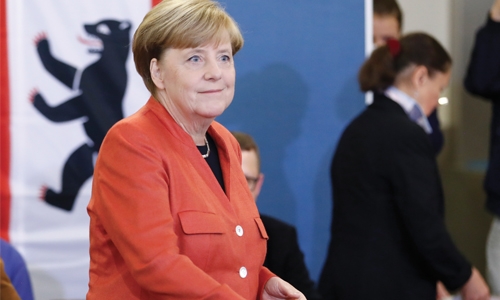German Election: Merkel wins fourth term
Berlin : Chancellor Angela Merkel clinched a fourth term in Germany’s election yesterday, but her victory was clouded by the hard-right AfD party winning its first seats in parliament.
Merkel, who after 12 years in power held a double-digit lead for most of the campaign, scored around 33 percent of the vote with her conservative Christian Union (CDU/CSU) bloc, according to exit polls.
Its nearest rivals, the Social Democrats and their candidate Martin Schulz, came in a distant second, with a post-war record low 20-21 percent.
But in a bombshell for the German establishment, the anti-Islam, anti-immigration Alternative for Germany (AfD) captured around 13 percent, making it the country’s third biggest political force.
While the likelihood of the AfD winning seats was clear for months, commentators called its strong showing a “watershed moment” in the history of the German republic.
Supporters gathered at the party headquarters in Berlin cried out with joy as public television reported the outcome, many joining in a chorus of the German national anthem.
The four-year-old nationalist party with links to the far-right French National Front and Britain’s UKIP has been shunned by Germany’s mainstream.
It is now headed for the opposition benches of the Bundestag lower house, dramatically boosting its visibility and state financing.
Alarmed by the prospect of what Foreign Minister Sigmar Gabriel branded “real Nazis” entering the Bundestag for the first time since World War II, the candidates had used their final days of campaigning to implore voters to reject the populists.
Germans elected a splintered parliament reflecting an electorate torn between a high degree of satisfaction with Merkel and a desire for change after more than a decade of her leadership.
Another three parties cleared the five-percent hurdle to be represented in parliament: the liberal Free Democrats at around 10 percent and the anti-capitalist Left and ecologist Greens, both at about nine percent.
As Merkel failed to secure a ruling majority on her own and with the dejected SPD ruling out another right-left “grand coalition” with her, the process of coalition building was shaping up to be a thorny, potentially months-long process.
Breaking taboos
Merkel, 63, whose campaign events were regularly disrupted by jeering AfD supporters, said in her final stump speech in the southern city of Munich that “the future of Germany will definitely not be built with whistles and hollers”.
Merkel, often called the most powerful woman on the global stage, ran on her record as a steady pair of hands in a turbulent world, warning voters not to indulge in “experiments”.
Pundits said Merkel’s reassuring message of stability and prosperity resonated in greying Germany, where more than half of the 61 million voters are aged 52 or older.
Her popularity had largely recovered from the influx since 2015 of more than one million mostly Muslim migrants and refugees, half of them from war-torn Syria, Iraq and Afghanistan.
But the AfD was able to capitalise on a wellspring of anger over the asylum issue during what was criticised as a largely lacklustre campaign bereft of real clashes among the main contenders.
The party has made breaking taboos its trademark.
Gauland has called for Germans to shed their guilt over two world wars and the Holocaust and to take pride in their veterans.
Related Posts

